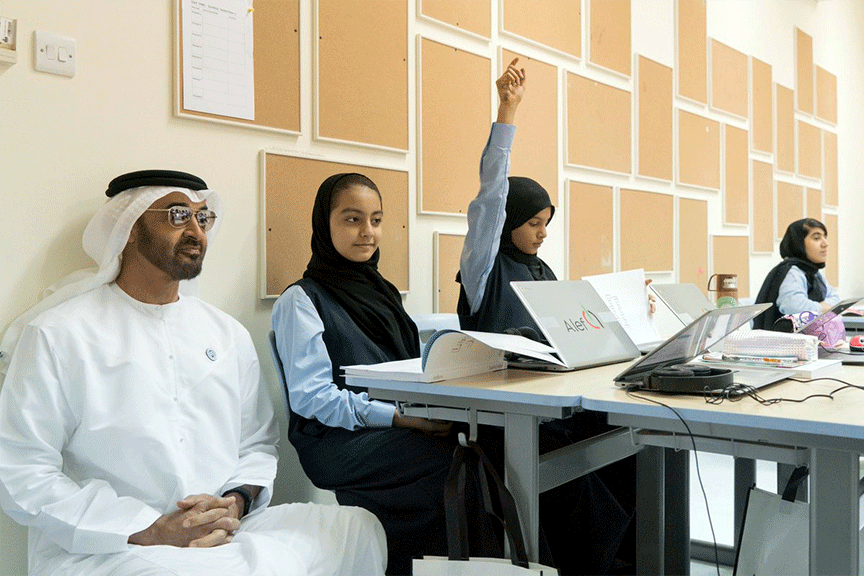The UAE has been able to transform the educational system from the era of katatieb (primitive school) to the era of future schools, or the so-called Emirati school, within a short half a decade.
The start of that transformative journey was the statement of Sheikh Zayed bin Sultan Al Nahyan, founder of the UAE, "The wealth of any advanced nation is its educated sons and that the progress of people and nations is measured by the level and the spread of education."
The Emirati school then
In the run-up to the union in 1971, there were only a handful of schools, meaning that only a fifth of the population could read and write. The system of katatieb and knowledge seminars were the first educational system that emerged in the UAE and marked the beginnings, where students were introduced to literacy, the Koran and the hadith.
The UAE subsequently moved to semi-formal and then formal education, opening schools and bringing scientists to run them and teach our children. The real breakthrough in UAE education however, was the establishment of the Union, when the Ministry of Education was established and the development of education, curricula and teaching methods followed. However, there were some challenges, as represented by the small number of attending students, which did not exceed 28 thousand. For example, transportation was difficult and those who wished to complete their post-secondary education had to be sent abroad.
Efforts pay off
In just two years after the union was established, the Ministry of Education ran 110 schools with 40,000 pupils, and education continued to develop until, in 2014, the country's illiteracy rate reached only 1 percent, according to the United Nations Educational, Scientific and Cultural Organization (UNESCO) statistics institute.
The UAE government subsequently transferred the smart knowledge it adopted in its ministries to the education system, especially when the Ministry of Education implemented the “Alf” Education System in 10 public schools in Abu Dhabi as of September 2018 as a first stage.
The “Alf” system converts the learning process from the traditional model to a student-centered model, and by using artificial intelligence technology in the classroom, the role of the teacher becomes an auxiliary and a guide rather than an indoctrinator.
The rising excellence of UAE students is a testament to the committed focus of the UAE Government with regard to improving the educational process. We see this in the case of Aryam Khalifa Al Kaabi, a young Emirati student that was ranked first country wide in high school with a GPA of 99.3% last school year.
Emirati school in the future
The UAE government has not only endeavored to develop the Emirati school in the current stage, but has begun to imagine the shape of its schools in the future, aiming to remove education in its traditional form from all schools in the UAE.
The public schools in the country aim to become virtual, unconstrained by time or place and would not include books or papers, but will rely on tablet computers or laptops connected to the Internet for all students and teachers. According to educators and specialists in educational technology, it is likely to take shape within 10 years, particularly in light of the gradual shift in schools to smart learning.
In this context, the interest of the UAE leadership in the educational process is widespread. HH Sheikh Mohammed bin Rashid Al Maktoum announced on Twitter the launch of the new generation of state schools; `` Our future generations need different ideas and new tools for the future,” he said. This is evident in the design, robotics and industrial intelligence laboratories to be introduced into modern schools, the first of which is supposed to cost a billion and a half dirhams, according to His Highness' tweets via Twitter.
The decision of His Highness Sheikh Mohammed bin Zayed to appoint His Highness Sheikh Diab bin Mohammed as Chairman of the Early Childhood Authority for the Emirate of Abu Dhabi represents a deeply insightful decision by the wise leadership for the advancement of today's children as the leaders of tomorrow.
Specialists based their expectations on the future shape of the UAE schools on the National Agenda 2021 vision, which focused on the development of a high-level education system. All schools and universities will be equipped with smart devices and systems to empower curricula, projects and research.
The National Agenda also looks forward to making UAE students among the best in the world in tests to assess knowledge and skills in reading, math and science, in addition to raising the rate of graduation from high school to be proportionate to international rates.
